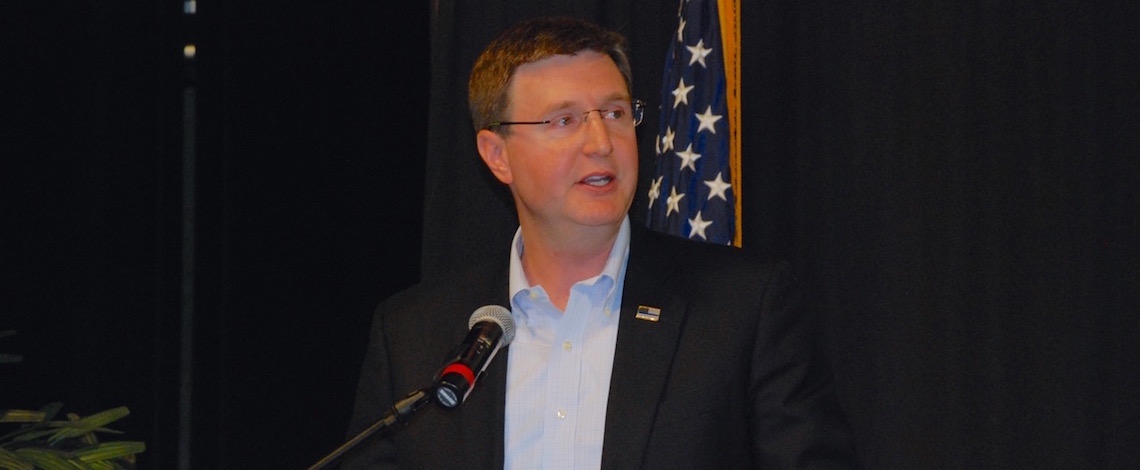
Ray Starling, special assistant to the president on agriculture, speaks to farmers attending California Citrus Mutual’s Citrus Showcase March 8 at the Visalia Convention Center. Photo by David Castellon
Written by
VISALIA — President Donald Trump’s attacks on the North American Free Trade Agreement may have some in California’s agricultural industry worried about losing valuable export markets in Canada and Mexico.
But Ray Starling, special assistant to the president on agriculture, told citrus growers gathered recently at the Visalia Convention Center that despite the claims of his critics, Trump isn’t against foreign trade.
“We want to make clear that we want to sell more overseas and north and south of our borders,” said Starling, the keynote speaker at California Citrus Mutual’s Citrus Showcase, an annual meeting and trade show for citrus farmers across California.
“We understand that we grow enough here [in the U.S.] already that if the only customers we had were those inside the United States, the profit margins in our sector would absolutely disappear,” Starling told the large audience. “Ninety-five percent of our customers are located outside the United States of America. We get that. We understand that.”
What Trump has issues with are agreements in which the trade of goods isn’t balanced, with the other nations involved faring better than the U.S., or situations where other nations reinterpret those agreements or violate terms outright, he added.
“We think it’s important to explore agreements we already have,” which is why the U.S. is renegotiating NAFTA and why the president has indicated he would support a revised agreement if the terms are more favorable to the U.S., Starling said.
He also spoke on the Trans-Pacific Partnership, a trade agreement between the U.S., Australia, Brunei, Canada, Chile, Japan, Malaysia, Mexico, New Zealand, Peru, Singapore and Vietnam that was never ratified after the U.S. withdrew its involvement last year, as Trump had promised to do during his campaign for president.
“Certainly, most of you heard the president’s remarks a few week ago that he would entertain having a conversation with the TPP countries. I think this reference goes to make the point that the president is not against trade. He’s against trade that gives away the tools that we have to protect our domestic industries while we get very little in return,” Starling said.
“So the word on TPP is stay tuned.”
On the subject of whether U.S. agricultural goods could face new tariffs in foreign markets in response to the president’s decision to put tariffs on foreign aluminum and steel, Starling said in an interview after his speech that it surprises him that people are surprised the president is doing what he promised to do on the campaign trail to bolster the U.S. steel industry.
And while there may be retaliation that hurts the ag industry and food manufacturers, along with businesses in other economic sectors, Starling said the administration is looking at ways to mitigate those effects.
“We believe the best way to mitigate that is to find new markets.”
For his part, Citrus Mutual President Joel Nelsen said tariffs being imposed on U.S. ag goods over trade issues that don’t involve the industry is nothing new.
“So this unintended consequence, it always occurs in a trade arena,” said Nelsen, adding that he’s comfortable with U.S. Secretary of Agriculture Sonny Perdue’s assurance during his visit to Tulare County last month that he would work to ensure ag doesn’t get hurt in trade disputes.
“Let’s get through the noise and see what actually happens.”
Citrus Mutual is an Exeter-based advocacy group representing about 2,500 citrus growers who farm about 75 percent of California’s commercial groves.
Starling noted that he and Perdue have strong agricultural backgrounds, and the president has reached out to farmers, first by inviting some to the White House to discuss their concerns and needs, and then sending Perdue out on a six-month tour to meet with farmers across the country.
That resulted in the Trump administration setting a series of goals for the ag industry that include working on an immigration plan that provides a reliable and legal workforce for the nation’s ag industry, cutting down on regulations for the ag industry and providing more broadband service to rural areas, he said.
On the immigration issue, Starling told the crowd, “We need to get to the root of this challenge and not just throw something over and pretend that it sticks. I can tell you that access to labor is absolutely an economic challenge to agriculture, and we will be spending time on trying to find out what is politically and fairly possible in this area.
If a legislative fix can’t be made, Starling said the administration is looking at possibly revamping the nation’s existing ag guest-worker program.
“My point is, we in the administration are willing to do what we can with or without Congress to try to alleviate and address this challenge.”
On the subject of the ag industry being the victim for years of a regulatory onslaught, “That era is ended,” at least on the federal, side, Starling said, noting that the Trump administration already has eliminated more than 700 regulations and is seeking input from the ag industry on others that should be nixed.
One of Starling’s primary messages was to let farmers and others here know that they are being heard, and there are people in the White House looking out for their best interests,
“Your sector has a voice in this administration,” he said.








